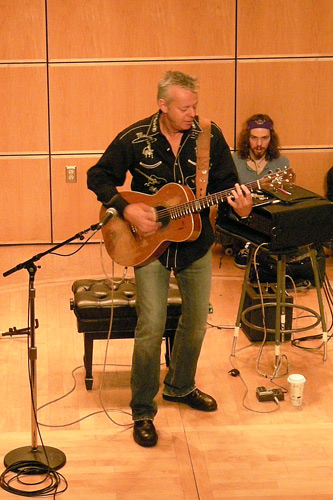Tommy Emmanuel: Embracing Repetition

Tommy Emmanuel
Photo by Matt Doland

A few lucky students got to sit on stage for the standing-room-only clinic.
Photo by Matt Doland
Acoustic guitar great Tommy Emmanuel has visited Berklee twice now and both times his presence has generated high-volume buzz. The first time, in 2006, all the chatter came after his clinic. Back then, only a handful of people were aware of his extraordinary technique and interpretive talents. But news travels fast at a place like this, especially when the subject is a musician with the sort of gifts Emmanuel has.
So his second Berklee clinic and performance, held in the David Friend Recital Hall earlier this semester, followed weeks of anticipation. The room was packed to overflowing long before Emmanuel stepped on stage. And when he did, he invited students standing along the edges of the room to sit on the stage, in a ring around him. It was a casual and friendly gesture, one that exhibited the same sort of warmth and openness Emmanuel displays on stage.
For more than an hour, Emmanuel performed instrumentals and answered questions from students. He played originals like "Train to Dusseldorf"; Merle Travis's "Nine-Pound Hammer"; and a long list of innovative renditions of Beatles songs, including "Here Comes the Sun," "Daytripper," and "Michelle." An edited transcript of Emmanuel's comments follows.
On practicing
I have no set routine because I'm always traveling. What I do is I carry this guitar in a zipped bag, I take it with me everywhere I go. . . . There are days when I can't stop playing, when I have a burning desire to play and I have things I'm working on. And there are days when I keep it with me because it's my constant companion. You get to the airport, you get checked in, you go in and find your gate. Sit down, find a quiet spot, get your guitar out, and play it. I do it nearly every day of my life. I've played at every airport in the world just about, and . . . I've written a lot of songs at airports.
On getting his hands to do the amazing things they do
Like the rest of you in this room, I need repetition to become better at what I'm doing and to learn how to train my hands to do what I need them to do. Repetition is my weapon, my friend, and is something that I use all the time.
We're learning motor skills; we're trying to teach our bodies something they've never done before. And 9 times out of 10 they don't want to do it. You've got to persist with it. Not only will that happen but your hands will change shape to what you need them to do. I've got two completely different thumbs, this one here is all modified, the bone comes out. This one here is straight like a finger. That's what happens if you play enough. Your body will provide you with the ability to do what you want to do in your mind and in your spirit.
On songwriting
When I write songs, I never think like I'm a guitar player. Don't ever put yourself in the box of, like, "I'm a guitar player so I'm going to write guitar player's music." I write songs as if I'm writing for a singer. So my melodies have to be singable. And when I play the guitar I don't think just like a guitar player. I think like a band with a singer. . . . It takes you from the realm of just being a solo instrument, and it also creates this aural illusion so that people who haven't seen me play before look around for who else is on stage.
On getting inspired
A songwriter waits patiently for inspiration, because without inspiration you don't write anything that's really totally off the chart. And a lot of times if I get an idea that excites me so much, I can't do anything until I've finished it. I can't eat, I can't think. I've gotta write this song now and I'm totally immersed 100 percent. Do what you can to open yourself up to what needs to happen. And what I used to do is I'd get up in the morning and while I'm having my coffee I would put on Chopin's nocturnes. What beautiful music that is. Then while I'm having my breakfast I'd put on Stevie Ray Vaughan's In Step. And during the course of the day I'd listen to some Joe Satriani, and then I'd put on Segovia. And I would expose myself to so much different music that something would cause the door to open.
On being himself
My secret weapon is that I'm just myself. All the time. I don't have to do anything else but just do what I feel and what comes natural to me. I don't need to put on any particular kind of exterior to impress you or to win you over. I just need to do a good job and be the best I can. I keep it that simple.
Some audience members at Tommy Emmanuel's 2009 Berklee clinic posted videos on YouTube.
Matt Dolland '10, a professional music major and guitar principal from Galion, Ohio, contributed to this report.
